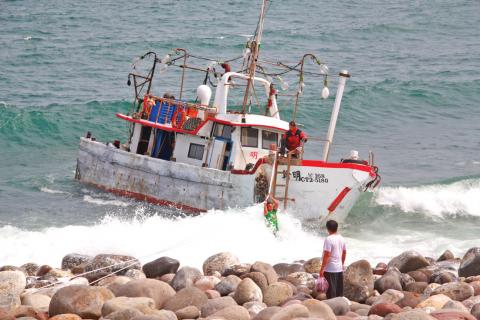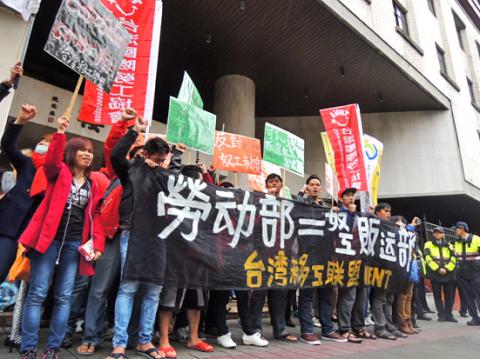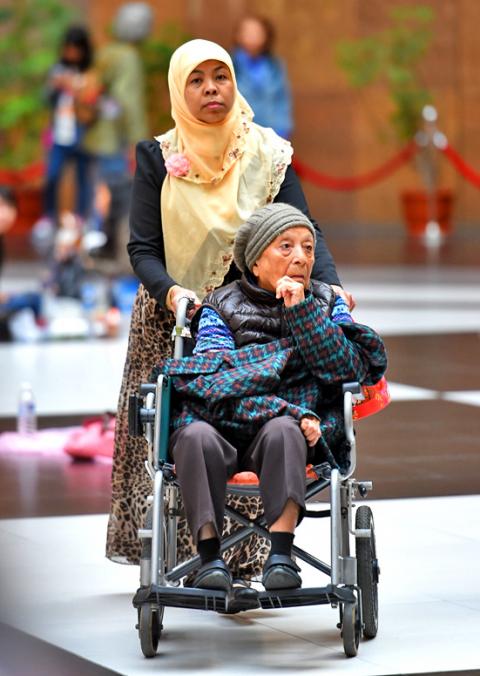Starving, dehydrated and sleep deprived due to the constant pangs of hunger, Gil L looked around the cramped deck of the small Taiwan-registered fishing vessel he had been bonded to. He wondered how much more he could take before the slave-like conditions of his job, or the captain of the vessel himself, did him in.
A native of Iloilo Province in the southeastern region of Panay Island, Philippines, Gil, whose real name has been concealed to protect his identity, had been in Taiwan only a few weeks. What was to have been a life-changing opportunity for his family, dealt a triple blow of natural disaster, sickness and poverty, was quickly turning into a deadly nightmare.
SEEKING A BETTER LIFE

Photo: Wu Cheng-feng, TT
With his father sick and aging and his small family farm destroyed by Typhoon Yolanda, Gil sought employment abroad. After taking out a loan to pay a placement fee of around US$2,000 to a manpower agency in the Philippines, a hefty percentage of which then went to a brokerage firm in Taiwan, he was placed as a crewman aboard a fishing vessel operating off the coast of the main island of Penghu County.
Starting work at sunrise each day, Gil and his three crew mates were only allowed one small meal when work ended no less than 12 hours later, after their catch had been brought in, taken to port and sold. The captain, Gil recounts, was a tyrant. When he or any of the workers under the captain’s command would request a moment to drink water to stave off dizzy spells or a bit of food, a savage blow to the back of the head was often his only response.
For putting his life in jeopardy, the fisherman’s recompense, after deductions taken out by his broker and manpower agency to repay his loan, was not more than a few thousand New Taiwan dollars per month. It was far less than the already humble sum listed in the contract he was only allowed to see once, and never given a copy of.

Photo: Huang Pang-ping, Taipei Times
After a month of enduring these inhumane conditions, Gil had enough and asked his Taiwanese broker for permission to transfer to another vessel. He received only an angry response. When posed with the same request, his captain not only refused, but threatened to murder Gil. He then stated flatly that he has connections in the Philippines who could, on his orders, dispatch Gil’s entire family.
Fortunately, one of Gil’s crew mates was able to get in touch with Ruby Comida, a member of Migranteng Kababaihan sa Taiwan (MKT, Migrant Women in Taiwan), a non-governmental organization (NGO) which advocates for the rights of migrant laborers, fishermen and caregivers. Comida, also a Philippine native, and a two-time survivor of sexual abuse while working in Taiwan, put Gil in contact with the Serve the People Association (SPA, 桃園縣群眾服務協會), another NGO fighting for the rights of migrant workers. With the help of the SPA, Gil and two of his countrymen were able to safely leave Penghu and arrive at the SPA shelter in Taoyuan. Their Indonesian crew mate, however, perhaps fearing he would fare little better elsewhere, remained behind.
Just one week removed from his ordeal, Gil still has nightmares about his time in Penghu.

Photo: Chang Chia-ming, Taipei Times
“I am afraid because I know that this is his country,” Gil said of his former captain. “He can do anything he wants. Who am I to refuse him, to disobey his orders?”
UNFAIR SYSTEM
The main problem for migrant workers in Taiwan such as Gil is that they are purposely kept in the dark about Taiwan’s labor regulations by those who purport to serve and protect their rights, only learning of them after they have been exploited. Furthermore, already facing grave economic hardship, many workers are ill-equipped, and ill-advised, to fight back.
Thanks to the SPA, though, Gil and other rescuees like him are learning about their rights — or lack thereof. They now know that the main problem is that they are not covered by the Labor Standards Act (勞動基準法), the set of protective laws governing all Taiwanese employees and foreign white-collar workers in Taiwan. For whatever reason — various NGOs believe it to be pressure placed on the government by powerful economic interests that benefit from near-slave labor — the laws simply have not been extended to the Southeast Asian migrant worker community.
Further adding to the obstacles faced by labor rights organizations in securing equitable treatment for migrant workers is a lack of local advocacy, save for a handful of NGOs and church-affiliated groups, combined with the hit-and-miss efforts of the Ministry of Labor.
Lennon Wong (汪英達), international coordinator with the SPA, remains just as disgusted with the deplorable conditions faced by migrant workers as he was when the Taipei Times first spoke to him in February. Visibly animated, he breaks down the service charges levied on the the workers by their Taiwanese brokers.
For instance, migrant workers are not allowed to go to the National Immigration Agency (NIA) on their own to process their Alien Resident Certificate, an ID card required of all foreign residents working and living in Taiwan. Western white-collar workers easily complete the process without much assistance. Migrant workers, however, are charged a fee (in addition to the ARC processing fee) for the unneeded accompaniment of their broker to the NIA.
This isn’t the only case of these workers being unmercifully taxed to death. When a foreign white-collar worker in Taiwan wishes to leave the country, the most expensive means of reaching Taoyuan International Airport from Taipei would be by taxi, a one-way trip costing around NT$1,000. Migrant workers, however, often have no choice but to pay their brokers approximately NT$2,000 to ride in a company van.
Wong becomes exasperated, especially when he says that the brokerage agencies have recently lobbied the government to increase the already excessive service fees they are charging.
“I am really dissatisfied with all of these agencies,” says Wong, his tone filled with contempt. “They have to do something about the brokers, because the bastards are the brokers that exploit [the workers] so much.”
Wong is as adamant about the migrant worker system’s endemic corruption.
“Completely corrupt, yes,” he says.
BLATANT EXPLOITATION
Evidence has emerged that some brokers operate with such impunity that they have no qualms with openly placing migrant workers into jobs in industries that are closed to them by law.
Merly Ramos, whose full name has been concealed to protect her identity, hails from Pangasinan, Philippines. Ramos, 26, thought she was coming to Taiwan last year to work as a caregiver. Upon arrival, she was instead put to work on a farm in Miaoli, despite the fact that the agriculture industry is not open to foreign labor. Ramos, and many like her, worked in the fields, out in the open, for any passerby to see.
For a year, Ramos performed farm duties such as planting rice and feeding farm animals, in addition to serving as a domestic helper and caregiver to a supposedly elderly ward — one who was in fact only in her mid-50s and entirely physically able.
In 365 days of employment, Ramos says she had one day off, Jan. 25, a single reprieve she won only by complaining to her manpower agency in the Philippines. She did not run away, but visited a park in Zhongli, the first time she was allowed off her employer’s property.
Later, when Ramos’ ward became physically abusive, she reported her treatment to the Miaoli branch of the Ministry of Labor. With assistance from the SPA, she was able to safely leave the farm and take refuge at the SPA shelter.
JOINING THE CAUSE
Fortunately, there is a growing number of young Taiwanese taking interest in the rights of migrant workers. Catta Chou, 25, was first drawn to the cause when she went to Australia on a working holiday visa two years ago, finding work through a Taiwanese broker as a supermarket cashier. Upon receiving her first paycheck, she realized that her wages were not what she had been promised. Equipped with a tenacious spirit and drawing on her fluency in English, Chou raised the issue both in Australia and Taiwan. For seeking only what she was owed, she was terminated.
Upon staging a press conference to tell her story, Chou found that the Taiwanese media were less than sympathetic to her plight.
“They portrayed me as a very annoying girl,” she says bitterly. “The media was like, ‘This girl is making something out of nothing.’”
That experience inspired Chou to volunteer as a translator with the SPA and MKT, providing a much-needed service in mediation between migrant workers, their Taiwanese brokers and the Ministry of Labor. But mere advocacy for equal rights, she says, is not enough. For true progress to be made, prevailing attitudes toward those who raise their voice and ask only for their basic human rights need to change.
TELLING THEIR STORIES
Oftentimes, Chou says, Taiwanese think that Southeast Asian workers flee their employers simply because running away is part of their culture. That perception exists because people don’t know what happened before the workers escaped. She adds that education and telling the full stories of the workers is key.
On a weekend last month in Zhongli, at the same park Ramos visited on her only day off last year, the third annual Winder Music Festival (發條音樂節) attracted bands and music fans from around Taiwan. At the park’s south end, amid a string of booths erected for various NGOs to promote their causes, the women of MKT shared their stories of abuse while working in Taiwan.
One of the people who helped arrange the platform to share these stories is Winder Festival volunteer Tseng Yi-yun (曾逸芸). The 18-year-old high school student witnessed firsthand the mistreatment of migrant workers when she saw an uncle abuse an Indonesian domestic helper. Tseng, who thought of the helper as a friend, helped her get away to safety. She has since been seeking more avenues to aid the voiceless.
“It won’t really change if we’re doing this,” Tseng says of merely helping migrant workers get away from abusive conditions. “The values ... [of Taiwanese] won’t really change. I’m trying to change the values.”
With a growing chorus of voices rising in support of migrant workers’ rights, the future looks, perhaps, a little less bleak for this highly vulnerable population. At the Winder Festival, MKT President Jasmin Ruas addressed a crowd of young Taiwanese who took time to sit and listen to migrant worker stories of trial and heartache, of pain physical, emotional and spiritual. She spoke in short, heartfelt declarations — simple statements belying profound truths.
“You are the future. We are the same. Filipinos work with our heart.”

March 10 to March 16 Although it failed to become popular, March of the Black Cats (烏貓進行曲) was the first Taiwanese record to have “pop song” printed on the label. Released in March 1929 under Eagle Records, a subsidiary of the Japanese-owned Columbia Records, the Hoklo (commonly known as Taiwanese) lyrics followed the traditional seven characters per verse of Taiwanese opera, but the instrumentation was Western, performed by Eagle’s in-house orchestra. The singer was entertainer Chiu-chan (秋蟾). In fact, a cover of a Xiamen folk song by Chiu-chan released around the same time, Plum Widow Missing Her Husband (雪梅思君), enjoyed more

Last week Elbridge Colby, US President Donald Trump’s nominee for under secretary of defense for policy, a key advisory position, said in his Senate confirmation hearing that Taiwan defense spending should be 10 percent of GDP “at least something in that ballpark, really focused on their defense.” He added: “So we need to properly incentivize them.” Much commentary focused on the 10 percent figure, and rightly so. Colby is not wrong in one respect — Taiwan does need to spend more. But the steady escalation in the proportion of GDP from 3 percent to 5 percent to 10 percent that advocates

From insomniacs to party-goers, doting couples, tired paramedics and Johannesburg’s golden youth, The Pantry, a petrol station doubling as a gourmet deli, has become unmissable on the nightlife scene of South Africa’s biggest city. Open 24 hours a day, the establishment which opened three years ago is a haven for revelers looking for a midnight snack to sober up after the bars and nightclubs close at 2am or 5am. “Believe me, we see it all here,” sighs a cashier. Before the curtains open on Johannesburg’s infamous party scene, the evening gets off to a gentle start. On a Friday at around 6pm,

A series of dramatic news items dropped last month that shed light on Chinese Communist Party (CCP) attitudes towards three candidates for last year’s presidential election: Taiwan People’s Party (TPP) founder Ko Wen-je (柯文哲), Terry Gou (郭台銘), founder of Hon Hai Precision Industry Co (鴻海精密), also known as Foxconn Technology Group (富士康科技集團), and New Taipei City Mayor Hou You-yi (侯友宜) of the Chinese Nationalist Party (KMT). It also revealed deep blue support for Ko and Gou from inside the KMT, how they interacted with the CCP and alleged election interference involving NT$100 million (US$3.05 million) or more raised by the